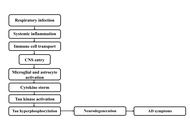
Progress in Alzheimer's disease research: etiology, molecular mechanisms involved in disease progression, and advances in therapies aimed at slowing or reversing neurodegeneration
Guest Editor
Prof. Ryszard Pluta E-Mail
Department of Pathophysiology, Medical University of Lublin, Lublin, Poland
Research Keywords: Brain ischemia, brain ischemia versus Alzheimer’s disease, etiology of Alzheimer’s disease, neurodegeneration, neuroinflmmation, amyloid, presenilins, tau protein, apolipoproteins, autophagy, apoptosi
About the Special lssue
Current Alzheimer's disease research is focused on elucidating its etiology and molecular intricacies, which despite more than a century of research are not definitively understood. At the neuropathological level, the hallmarks of Alzheimer's disease are amyloid aggregation and tau protein hyperphosphorylation, which result in the formation of amyloid plaques and neurofibrillary tangles, respectively. These two molecules cause neuronal death and affect the functioning of the neuronal network, synaptic transmission, and ultimately cognitive abilities. Current research is focused on demonstrating what drives amyloid formation and its behavior, and on tau protein modifications. One of the theories being considered is the ischemic theory of Alzheimer's disease. In connection with this theory, ongoing molecular studies aim to elucidate the precise mechanisms that drive the changes in amyloid and tau protein, which regulate their synthesis, clearance, and cytotoxicity, as well as their interactions with cellular phenomena such as oxidative stress, mitochondrial dysfunction, and neuroinflammation. In addition, genetic studies in this model have identified changes in the expression of genes associated with Alzheimer's disease, shedding new light on the molecular pathways involved in the pathogenesis of the disease. Using advanced molecular techniques, including genome editing, proteomics, and high-resolution imaging, work is underway to decipher the etiological and molecular basis of Alzheimer's disease development. Insights gained from these efforts hold promise for the development of targeted therapies to prevent, slow, or reverse these molecular changes, offering the prospect of effective interventions in the fight against Alzheimer's disease.
Keywords: Amyloid, plaques, tau protein, neurofibrillary tangles, neuroinflammation, synaptic dysfunction, oxidative stress, mitochondrial dysfunction, blood-brain barrier, dementia, biomarkers, vascular changes versus Alzheimer’s disease, ischemia versus Alzheimer’s disease, traumatic brain injury versus Alzheimer’s disease, apnea versus Alzheimer’s disease, perinatal asphyxia versus Alzheimer’s disease
Published Articles


